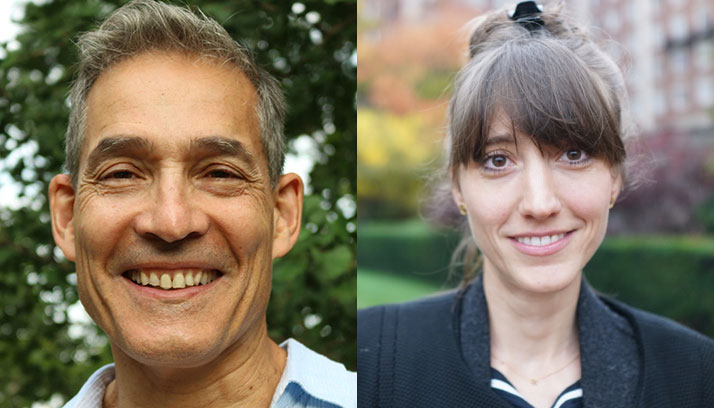A newly-published paper on teen internet use reports that adolescent girls with a history of sexual abuse are more vulnerable to online cyberbullying.
Researchers found that sexually abused girls were more likely to fit into a high-risk profile characterized by high internet, social media and pornography use, but also higher levels of substance abuse and depression, low parental support, poor grades and low self-esteem.
Girls in the profile were additionally more likely to be sexually solicited online and to engage in more sexual activity two years later than peers without a history of maltreatment.

George Bonanno, Professor of Clinical Psychology, and Director of the College’s Loss, Trauma & Emotion Lab; and Ann Christin-Haag, a post-doctoral researcher at the Lab. (Photos: TC Archives)
The report, appearing in the October issue of science journal Nature Human Behavior, reflects the findings of a consortium of scholars that included TC Professor of Clinical Psychology George Bonanno and post-doctoral researcher Ann Christin-Haag, a member of Bonanno's Loss, Trauma & Emotion Lab.
Bonanno served as senior author on the paper while Haag shared lead authorship with the leader of the study, Professor of Human Development & Family Studies Jennie Noll, the Director of the Pennsylvania State University Child Maltreatment Solutions Network.
Noll, Haag and Bonanno shared co-authorship of the Nature paper with academics at Penn State and NYU.
“Girls who had been sexually abused are more likely to be re-victimized both on and offline” Haag said of the findings. “While the internet has many benefits, it also provides new avenues for potential online revictimization and exploitation.”
The paper, “An observational study of internet behaviours for adolescent females following sexual abuse,” tracked the online activity of 460 adolescent girls, ages 12-16, between 2012 and 2015.
Participants were provided laptops equipped with a software program that allowed researchers to monitor the teens’ internet use. This use of software differed from previous studies of internet use, which generally rely on self-reporting by research participants.
“Tracking every keystroke provided so much data that we couldn’t yet use it all,” said Bonanno. “All the data are based on what the girls actually did while online. They were given computers knowing everything would be reported.”
The software provided the research team access to the cyber habits of two teen control groups. Each group fit a similar demographic and census (geographic) profile.
An analysis of the keystrokes showed that pornography viewership among abuse survivors was comparable to that of age-group peers unscarred by wrongdoing.
The differences surfaced when an analysis of online and offline risk variables in follow-up interviews revealed the vulnerability of survivors to exploitation.
“While internet activity alone may not confer risk, results indicate a subset of teens who have experienced childhood sexual abuse for whom online and offline factors contribute to problematic outcomes,” the authors write.
The author of the recently released book, The End of Trauma: How the New Science of Resilience Is Changing How We Think About PTSD (Basic Books/Hachette, 2021), Bonanno said childhood sexual abuse adds another dimension to his studies on the short- and long-term consequences of trauma.
“Adolescence is confusing enough without abuse,” said Bonanno.
“For (adolescents/teens subjected to sexual abuse) it brings confusion about what sex is and what sexuality might be. Their life almost becomes like science fiction.”
The vulnerabilities, when presented online, are evidenced for example in forms of oversharing personal information or disseminating provocative photos.
“High-risk and problematic internet use has been shown for victims of child maltreatment,” Haag pointed out.
Bonanno and Haag say that data collected from teens representing the first generation with a lifelong connection to high-speed internet offers a portal to further scrutiny of behaviors along with the exploration, development and implementation of measures to counter the damaging effects of certain internet behavior among young people.
“We know sexually abused girls are at-risk and this is an opportunity for targeted intervention strategies that could help at-risk teen girls navigate the internet,” said Haag.
If you are a student or faculty or staff member who has experienced sexual assault, Columbia’s Sexual Violence Response offers trauma-informed, confidential support, and prevention programs focused on ending gender and power-based violence.
